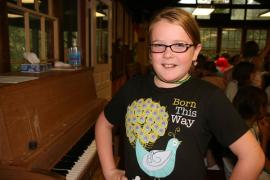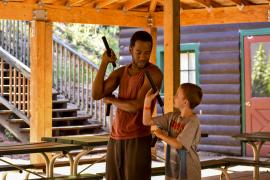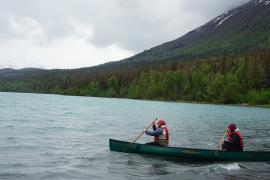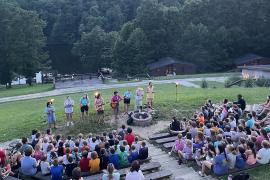We all know that representation matters. We sculpt the way we see the world and how we interact with it by what we come into contact with. Our reality is shaped by the people we encounter and the way they represent themselves and their identities. We learn to trust or not people based on how we see different identities depicted in the media, and we learn to “other” people when our culture shows that it is acceptable to do so. There has been pressure in the field of youth work for LGBTQIA+ people to keep their identities hidden so that they didn’t upset “the parents.” At the first camp I worked at, it was apparent pretty quickly — you could be who you were, and dress how you wanted, and you were absolutely welcome, but you were not to talk about your sexual orientation or gender identity with the kids. The policy was much akin to the US military “Don’t Ask, Don’t Tell” policy (a problematic policy that allowed gay, lesbian, and bisexual individuals to serve in the military, but only if they kept their sexual orientation secret), but there is one distinct and undeniable difference between being in the military and working with kids. Kids don’t have the capacity to follow their part of the policy — “don’t ask.”
Children learn through natural curiosity, and when they find something that they have not experienced before, they have the desire to explore it. Through that exploration they learn about the world and can also learn about themselves. There have been more than a few times in my life where I had to do verbal gymnastics to avoid the questions “are you a boy or a girl?” from inquiring seven-year-olds, and it was not because I did have the words to answer the questions. It was because I didn’t have the support I needed to feel safe to talk about it, or I was told directly that I wasn’t allowed to. So I would mumble my way through an incomplete or inaccurate answer, or I would avoid answering at all. Both of these response types only sent the message that those kids shouldn’t be curious about gender expressions that they hadn’t seen before, and that adults weren’t allowed to talk about it.
Silence is the great partner of shame. I was taught I should feel ashamed to share who I was because it would upset others. But by working to not upset others, where did that leave me? With a half-formed identity, and with the feeling that I was a liability to the organization that I served. And when I couldn’t answer those questions, I passed that shame on the kids, who quite possibly could have been asking because part of what they saw in me was something they saw in themselves.
In the 2019 Accelerating Acceptance Survey published by Harris Poll and GLSEN, we learn that 80 percent of non-LGBT American adults believe that LGBT people should have equal rights. I am sure that is much higher than it was when I was in school, which is great progress! However, only 66 percent of non-LGBT adults are comfortable with their child having a lesson in LGBT history, and only 61 percent are comfortable with their child having an LGBT teacher — which leads me to the questions of what equal rights are we talking about? Our culture has let the idea that LGBT people are too controversial to exist for too long. So long, in fact, that people are becoming less comfortable. In that same Accelerating Acceptance Survey, we see an increase in discomfort from 2016 to 2018 in both LGBT history being taught (5 percent increase) and LGBT teachers (4 percent).
But the truth is, LGBTQIA+ kids need to have role models that are positive, are like them, and don’t have to hide their true selves. There is an LGBTQIA+ mental health crisis that is bubbling not too far under the surface if you just know what you are looking for. Every 45 seconds in this country, an LGBT young person attempts to end their lives. Every 45 seconds. When we don’t show this vulnerable group of young people that there are adults who are like them, we don’t show them that they have access to a safe and hopeful future. Without positive representation, youth learn about themselves through media representations (which can be problematic at times), or the news (which often is sharing the harsh realities that LGBTQIA+ continue to face). Queer kids are often looking for people who will understand them without question and support them even when it gets messy. It is not unfounded that LGBTQIA+ adults are often their best shot at being an adult who they can confide in.
And it is also important that non-queer campers have adult role models that are in the LGBTQIA+ community. Having role models that are not like us help us build important relationships that allow us to build empathy and break down barriers. If we do not experience identities outside of what we normally see, we start to believe that our experiences are more valuable than other people’s experiences. When our culture also upholds some identities as more valuable, it renders us unable to build empathy with others who are not like us. Early introduction to positive representations of people of all genders and sexuality will lower the likelihood that children will grow up to bully those who fall outside what they define as “normal.”
On top of what the youth in our care need, queer adults deserve the dignity and respect to not be put in the situation where they feel they must be untruthful. At camp, we give so much of ourselves — our time, our talents, and literal blood, sweat, and tears. It is unfair to ask LGBTQIA+ staff members to give so freely of themselves, and then ask them to hide valuable pieces of their identity. When everyone comes to the table, as their full selves, prepared to build community with people of all different kinds, we can make the world just a little bit more beautiful for everyone — and not just some of us.
Chris Rehs-Dupin (he/him/his) spent the majority of his professional career (17 years) in youth development in the outdoors — including eight years in overnight programming, and nine years in day programming. In both cases, he worked with large agency camps. Chris is a passionate speaker, trainer, and educator who has spoken at numerous conferences, camps, and to larger organizations. Participants agree that Chris works to meet them where they are — and educates in the absence of shame.
Photo courtesy of Chris Rehs-Dupin
The views and opinions expressed by contributors are their own and do not necessarily reflect the views of the American Camp Association or ACA employees.




